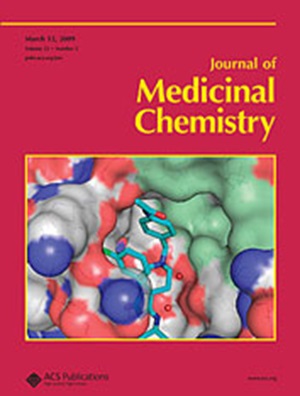Discovery of a Novel EF24 Analogue-Conjugated Pt(IV) Complex as Multi-Target Pt(IV) Prodrugs Aims to Enhance Anticancer Activity and Overcome Cisplatin Resistance
IF 6.8
1区 医学
Q1 CHEMISTRY, MEDICINAL
引用次数: 0
Abstract
Acquired resistance in cancer remains a significant challenge in oncology, posing obstacles to the efficacy of diverse therapeutic approaches. The nuclear factor-kappa B (NF-κB) signaling pathway plays an important role in the development of drug resistance in tumor cells. Herein, we employed NF-κB inhibitors and cisplatin to synthesize multitarget Pt(IV) antitumor prodrugs. Among them, the antiproliferation activity of complex 8 demonstrated a remarkable 146.92-time increase compared to cisplatin against A549/CDDP cells. Moreover, complex 8 could effectively induce DNA damage, promote ROS generation, induce autophagy, trigger the mitochondrial apoptosis pathway, and suppress cell proliferation through the NF-κB signaling pathway. Furthermore, complex 8 effectively downregulated the levels of VEGF and HIF-1α and exerted antiproliferative activity through the PI3K/AKT and STAT-3 pathway in A549/CDDP cells. Interestingly, complex 8 showed a superior in vivo antitumor activity than cisplatin, 5a, or their combination, suggesting its potential as a promising candidate for further drug development in lung cancer treatment.求助全文
约1分钟内获得全文
求助全文
来源期刊

Journal of Medicinal Chemistry
医学-医药化学
CiteScore
4.00
自引率
11.00%
发文量
804
审稿时长
1.9 months
期刊介绍:
The Journal of Medicinal Chemistry is a prestigious biweekly peer-reviewed publication that focuses on the multifaceted field of medicinal chemistry. Since its inception in 1959 as the Journal of Medicinal and Pharmaceutical Chemistry, it has evolved to become a cornerstone in the dissemination of research findings related to the design, synthesis, and development of therapeutic agents.
The Journal of Medicinal Chemistry is recognized for its significant impact in the scientific community, as evidenced by its 2022 impact factor of 7.3. This metric reflects the journal's influence and the importance of its content in shaping the future of drug discovery and development. The journal serves as a vital resource for chemists, pharmacologists, and other researchers interested in the molecular mechanisms of drug action and the optimization of therapeutic compounds.
 求助内容:
求助内容: 应助结果提醒方式:
应助结果提醒方式:


